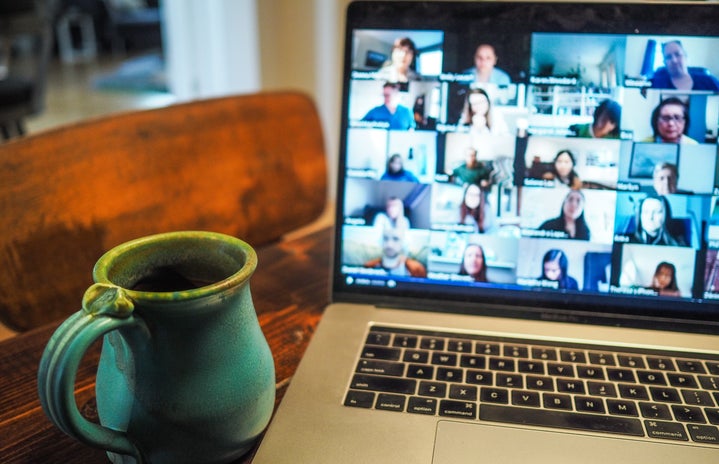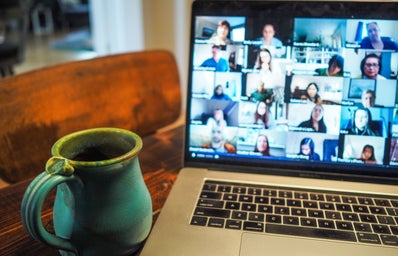The green-lit dot sitting atop my laptop screen is a familiar acquaintance of mine these days. I’m about 4 weeks into my New Semester’s Resolution to turn on my zoom camera for all classes. I felt bad for professors lecturing to a screen of faceless names, and I hated being a faceless name, emphatically aware of my isolation from the world. But to be seen through a webcam in a portrait of my bedroom corner, to be a grainy video delayed however undetectable in time, I have become an abstract representation of myself, and my education a mechanical reproduction of animate teaching. To my professors and peers I am another moving picture in the zoom gallery of uncanny faces, recognizable but unknowable and illegible. The content to be learned, the skills to be practiced, are mediated by wifi connection. It’s not just an experience of online learning, it’s a fundamental shift of the plane of existence on which life occurs. The distinctness of every physical presence we once shared at university does not digitize and cannot translate through the screen. We can no longer truly share ourselves, or share experiences in the personalized autonomies of our bodies. Instead we project a flat picture of our faces, with a small view of the real physical space we occupy. The visual supersedes the physical, the reproduction replaces the real. While the professor speaks I take visual laps once in a while, clicking through the pages of boxes, feeding my curiosity about these people I know are real and living their own lives, but appear in a mostly unchanged picture every week. My eyes flicker to myself, studying my expression and surroundings for something a stranger might be drawn to, or what thought my image might spark. Foolishly believing I can ever know these things or have control over them I find a good angle, or sit in such a way.
I think back to last year, when I’d prepare for class, getting dressed, probably putting on some makeup, and finally feeling ready when I looked and felt most like myself, or “best,” although I know they weren’t really the same thing. We create and perform ourselves when we make these choices of expression, and we enact ourselves through interaction. But we don’t live in a vacuum, and these choices and actions unfold in the shadow of social, cultural, and political institutions. This year, in preparation for the grocery store, or a zoom class, I go through similar motions in constructing a representation that attempts to reconcile what I feel is me and what I’ve learned is expected of me. With decreased interaction due to the pandemic, the virtual representation, the image, takes center stage.
As a socialized girl, the power of image is not new to me. I’ve been aware of my appearance since childhood, and beyond just that, I’ve been aware of the paramount value of my appearance- its connotations that are read instantaneously with my stride. As I create myself every morning, I negotiate with the scrutinizing eyes in the mirror that belong to the Man boys are raised to become. It’s not that I wish to attract attention from men, it’s that I’ve been conditioned to believe my womanhood is defined by their validation of any and all kinds. I’ve learned there are benefits to my own social and material capital for appealing in such a way. At the same time, I am aware of the dangers for appealing as a woman too conspicuously, and too knowingly, and that it’s my responsibility to walk this fine line. The dominant framework through which I’ve learned to encode myself and others learned to decode me, is politics of visual desirability. But at the end of the day, whether I fit into it or not, I can’t win. I walk down the street, I sit in the classroom, I eat in the cafeteria in the company of the invisible observer. As I feel the wind on my face, the chair beneath me, or the food in my mouth, I see my moving silhouette- do I look dumb? I see my posture in the chair- I’m hunched too much. I see my struggle to eat spaghetti in the daintiest way possible- Do I look crazy? My life splits in two, feeling and watching in real time, living life with an internal monitor tagging along. This monitor is the subconscious reminder in front of the mirror, while eating in the cafeteria, or hunching over in class, that managing the abstract or literal Man’s visual experience of me is my task, my own experience is incidental.
[pagebreak]
So I sit at my bedroom desk, always aware of the green dot, of the gazing camera that places an inverted mirror atop the lecture slides. As I’m taking notes, asking questions, or simply listening, I’m posing for a picture, I’m acting for the movie screen, playing the character of the modern woman. The woman who must be good at everything, and must look good doing it. Before, I would have to imagine my form as others saw it, now I have a live feed filling my life with it. I think we all watch and check ourselves on Zoom more than we like to admit, shifting position and facial expression. We are producing ourselves for viewing, something many young women will report is a daily activity and a near constant thought.
I sense this compulsion to appear attractive in class, more now than ever before, and the image of my face on the screen I am perpetually molding and judging. I ask myself why do I feel uncomfortable feeling unattractive? Why does my perceived desirability impact how inclined I feel to participate, to directly call attention to myself? I am accustomed to the idea that visual satisfaction must accompany any other contributions I can make. Beauty, attractiveness, desirability feels like a due women must pay to exist- to fully exist. But that is a lie, for the moment I can fit the standard, I am reduced to that alone. Neither striving for the standard, nor being the standard, brings about a full and free existence. The truth is, nothing I do for another person, be they specific or abstract, will liberate me, or will finally give me permission to just be and release me from this ensnare.
So what will? How do I live my life beyond careful curation? What do I do about the zoom camera that has become a new vehicle for the deep-seated white, male, heterosexual surveyor this culture has taught me I exist to entertain? One could say, “just turn your zoom camera off!” But that’s not solving the problem. I need to become comfortable being seen without needing to feel visually pleasing. I need to insist on my humanity and my worth as intrinsic rather than contingent. My beauty, your beauty dear reader, is not in the eye of some beholder. It is not in the eye at all actually, but felt, in your relationship with yourself alone. Radically accepting everything about yourself inside and out will eventually dissolve the inner monitor. Living and watching my life turns into just living it when I throw out the rules, the standards, the fear of judgement, and embarrassment misogyny has cast on to me for so long.
There is learning and unlearning to be done in all realms of life. But in the Zoomiverse specifically, I commit to taking up visual space no matter how I think I look. I commit to participating even when I want no eyes on me. In a society that wants my “inadequacies,” and individuality invisible, why do that work for it? And why affirm such arbitrary judgements of myself? To be comfortable with myself is the only way I’ll stop projecting cruel judgements into what I think others think of me. To accept myself is the only way I’ll live by my own values. To love myself in entirety is the only way I’ll stop worrying about my desirability to the male gaze.
For anyone who has felt that space in their head filled by another pair of eyes, the zoom classroom is an evolved environment of self-regulation. But what would it feel like to relinquish such regulation? What power can we find in being ourselves, without needing the permission slip of desirability to be included, to feel valuable? It may take time, but I know so much more awaits us on the other side of these walls they built and taught us to guard.


